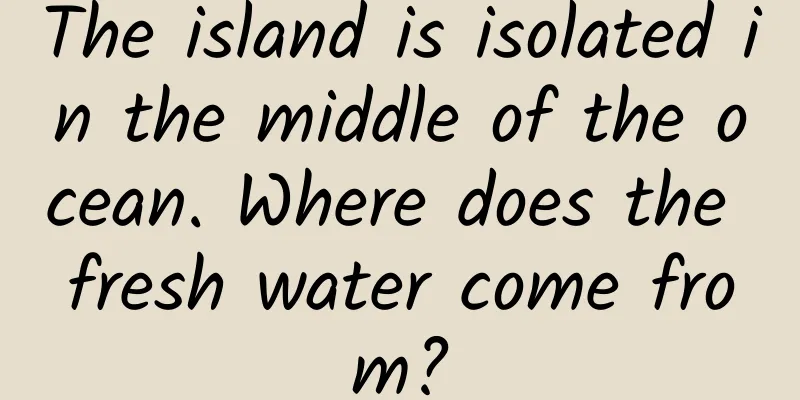The island is isolated in the middle of the ocean. Where does the fresh water come from?

|
The earth is a blue planet because most of the earth's surface is covered by oceans, and the total area of the oceans is about 2.7 times the total area of the land. Despite having so much water, humans are still facing the dilemma of fresh water shortage, because seawater is not fresh water. Although seawater is salty and bitter, there are many small freshwater reservoirs in the center of the sea, which are islands. When watching some "Cast Away" movies, we often see the protagonists stranded on deserted islands due to shipwrecks, and then looking for food and building houses. The most critical factor for them to survive on the island is the presence of fresh water on the island. Why do these people always happen to be stranded on an isolated island with fresh water? In fact, this is not a coincidence, because most isolated islands have fresh water. Life is extremely tenacious. Even in harsh saline-alkali environments, plants can survive. However, no terrestrial plant can survive on seawater. Therefore, as long as an island has vegetation, the island must have fresh water. Now the question is, the island is isolated in the middle of the sea, where does the fresh water come from? In fact, the fresh water on these islands is given by the sea. The sea is full of water, so the evaporation is huge. Taking my country's coastal waters as an example, the average annual evaporation is about 230 cm to 240 cm. Looking at the global ocean, about 505,000 cubic kilometers of seawater turns into water vapor under the sun every year. Water vapor floats to the sky and eventually falls. Some of it reaches the land with atmospheric circulation to form rainfall, while some lands on the islands in the middle of the sea. The fresh water on the island comes from rainfall, so how is this fresh water preserved? Some islands have small lakes due to their topography and the high rainfall in the area. Such islands naturally have abundant freshwater resources. However, many islands do not have such favorable prerequisites. The rainwater that falls on the island will gradually penetrate downward to form groundwater. If it falls on such an island, we need to dig wells to get water by ourselves. Wait, the island is surrounded by the sea. Since rainwater can penetrate into the ground, why can't seawater penetrate in and mix with fresh water? Because there are a lot of minerals in seawater, the density is very different from that of fresh water, so underground, fresh water and seawater will be stratified. Generally speaking, fresh water is distributed in the shape of a convex lens underground on an island, so it is easier to obtain fresh water by digging a well in the center of the island. However, digging for fresh water on an island also requires skills. If the digging distance is not well controlled, it is easy to cause seawater flooding. If flooding occurs, the precious underground fresh water will be destroyed. Although the island has underground fresh water, it is still limited after all. It can support the survival of a small number of desert islanders. If you want to build villages and towns on the island, the fresh water resources are obviously not enough. Therefore, water-scarce island countries and coastal countries still need to work hard on seawater desalination technology. In fact, seawater desalination is not difficult. The difficulty lies in how to achieve low-cost seawater desalination. At present, there are very few countries in the world that can master low-cost seawater desalination technology, and the effect is not ideal. It is very easy to distinguish whether an island has fresh water. You just need to observe whether there is vegetation on the island. So how do you judge whether an island has sufficient fresh water resources? An island with abundant freshwater resources is an island with freshwater lakes, and such islands are usually ideal habitats for birds. So when you are stranded on a deserted island, if you find a large number of birds living on the island, you can rest assured that there is a freshwater lake on the island. What if you are unfortunately stranded on an isolated island with no grass? There is no other way, because an isolated island without freshwater means that rainfall in the area is very scarce, and it is impossible to wait for God's blessing. In this case, we can only prepare freshwater by ourselves. Fortunately, the sunlight on the sea is very sufficient. As long as we have some containers, we can use evaporation to make freshwater. Fresh water can be made from seawater through evaporation, but the substance left over after making fresh water cannot be easily eaten. After all the water in the seawater evaporates, isn't salt the only thing left? No. Seawater is not just made up of salt and water. In addition to sodium chloride, there are many impurities in seawater. If you put them in your mouth, you will find that the taste is extremely bitter. Some of the substances in them are harmful to human health and are not suitable for consumption. Therefore, the "salt" obtained after drying the seawater is usually called "coarse salt". If you want to turn coarse salt into the fine salt we eat in daily life, it needs to be purified. The most traditional method of purifying coarse salt is the "salt field sun drying method", the purpose of which is to remove various impurities including calcium and magnesium ions in seawater and turn it into edible refined salt. For more information, please follow the official account: sunmonarch |
<<: Ginkgo biloba: a living fossil that can be seen and touched
>>: The quickest way to lose weight: Can you lose weight immediately by just lying down?
Recommend
Metaverse Marketing: 4 Transformations Brands Need to Face!
Since the beginning of this year, the "metav...
Holding back tears increases the risk of 3 diseases! Tears also have these unexpected benefits
"It's not a sin for men to cry." Wh...
It’s terrible: On average, a malicious program is created every 18 seconds on Android
[[139331]] With the popularization and widespread...
What is your mobile phone number "bound" to? Come and check it out
In this era where we can connect to the world wit...
Without the magic in The Three-Body Problem, how can we "broadcast" to the universe? This magical ring is the key!
This year, the science fiction novel "The Th...
Street stall fast-moving consumer goods can be understood from two aspects
During this period, whether in cities or rural ar...
Star Chaser | From snow-capped mountains, deserts, fluorescent seas to city landmarks, the sun, moon, and stars in my eyes
It took me five years to select 50 clips from mor...
How to promote financial management APP? Recommended cooperative resources for the promotion of financial products
What types of apps are the most popular in 2017? ...
Is it true that updating software can reduce radiation?
Audit expert: Meng Meng Associate Researcher at t...
Practical sharing: What is the hooked addiction model? How to use it to improve user activity and stickiness?
Let me share a new term, the HOOKED addiction mod...
"Water tiger" appears, this fish is very edible, has no friends and is still single...
Recently in Jiangxi Province, a lucky angler succ...
This "sunscreen magic tool" is really risky if used incorrectly! Many people still use it on their children...
Summer is coming Various "sunscreen magic to...
Apple can beat the FBI, but it may not be able to beat European countries
Bloomberg wrote today that although Apple’s main ...
Is eating too much rice the main cause of diabetes? Rice: I don't take the blame
A friend told Huazi that he had seen an article f...
88% of Apple users have disabled app tracking. What are the considerations for the remaining 12%?
The issue of APP obtaining user privacy has inten...









